Functionalism
1/37
Earn XP
Description and Tags
Name | Mastery | Learn | Test | Matching | Spaced |
|---|
No study sessions yet.
38 Terms
functional theory of stratification
Kingsley Davis and Wilbert Moore (1945); “Some Principles of Stratification”
stratification is universal and necessary
present in every society
role allocation and performance
qualified people in positions
higher rewards (income, prestige, power) as motivation
importance of positions
specialized skills with specific training, justifying greater rewards
meritocracy and motivation
stratification ensures that talent is distributed efficiently by providing incentives
most capable individuals rise to the top, leading to a meritocratic society
Talcott Parsons
dominant figure in sociology from the 1930s to the early 1970s
ideas became obsolete by end of the 70s
brought Durkheim and Weber’s ideas to US
interpreted Weber solely as functionalist
worked with Marianne Weber to translate Weber’s works
first book: The Structure of Social Action (1937)
central question: how is social order possible
critical of American theorists who focused on rational actor (homo economicus)
unit act (Parsons)
rational actor will use a rational means to achieve a goal: maximizing gains and minimizing losses.
actor —[means]—> end/goal
Parsons’ theory of social acts
actors are constrained by social conditions and cultural values
social conditions affect actors, means, and goals
culture (norms, values) affect actors, means, and goals
acts are not individual; they are very social
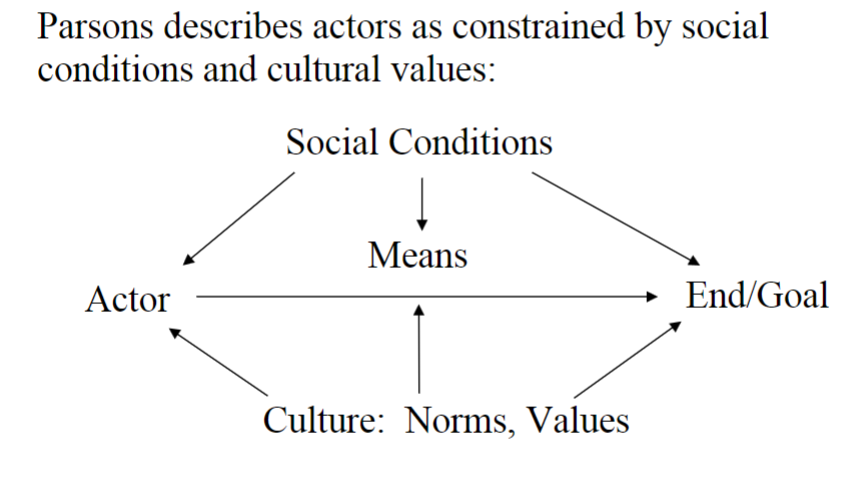
basic assumptions of functionalism (Parsons)
society is like an organism
societies must have some important force of social integration
societies have needs (functional imperatives)
Adaptation, Goal attainment, Integration, Latency
adaptation
first functional imperative. a system must adjust to its environment and adjust the environment to its needs (Parsons).
goal attainment
second functional imperative. a system needs to define and achieve its primary goals; motivation to act in certain ways (Parsons).
integration
third and most important functional imperative. a system seeks to regulate the interrelationships of its component parts. also involves the management of the relationships among the other three functional imperatives (Parsons).
social structures that tie us all together.
latency (pattern maintenance)
fourth functional imperative. culture (values, meanings, ethics) on both the individual and societal level (Parsons).
Parson’s functional theory of society as an organic system
social systems have internal order
social systems are functionally interdependent
social systems tend towards homeostasis or equilibrium
a change in one part of the social system affects other parts of the system
social systems create boundaries with their environment
the integration of the system and allocation of resources within the system are essential for equilibrium
Parsons’ four action systems in the functioning of society
cultural system (latency)
social system (integration)
personality system (goal attainment)
behavioral organism (adaptation)
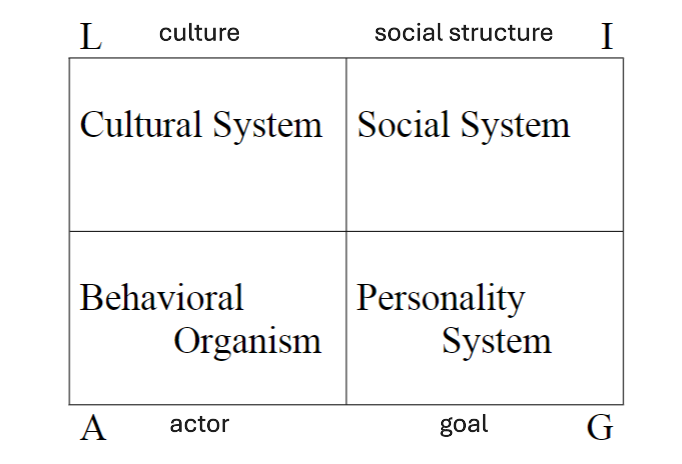
social system (Parsons)
associated with integration
individual actors interacting through time guided by culture (latency) and organized through status-role complex
must carry the value-orientations provided by the cultural system and meet the needs of the personality systems
responsible for socialization and social control (the means by which culture becomes integrated in to personalities)
status-role complex (Parsons)
status: social position
role: expected behavior of one who occupies a status
cultural system (Parsons)
associated with latency
patterned system of symbols, values, norms, and beliefs that provides basis for social integration
most important system (theory of cultural determinism)
personality system (Parsons)
associated with goal attainment
a motivational orientation carried by actors
composed of “need-dispositions”
(e.g. love, social approval, adherence to cultural standards, meet role expectations)
need-dispositions
drives that are shaped by society (Parsons)
e.g. love, social approval, adherence to cultural standards, meet role expectations
behavioral organism (Parsons)
associated with adaptation
the material source of energy for the rest of the systems (the physical body)
Parsons’ cybernetic hierarchy of control
latency = cultural system (information)
integration = social system (carries info down and energy up)
goal attainment = personality system (carries info down and energy up)
adaptation = behavioral organism (energy)
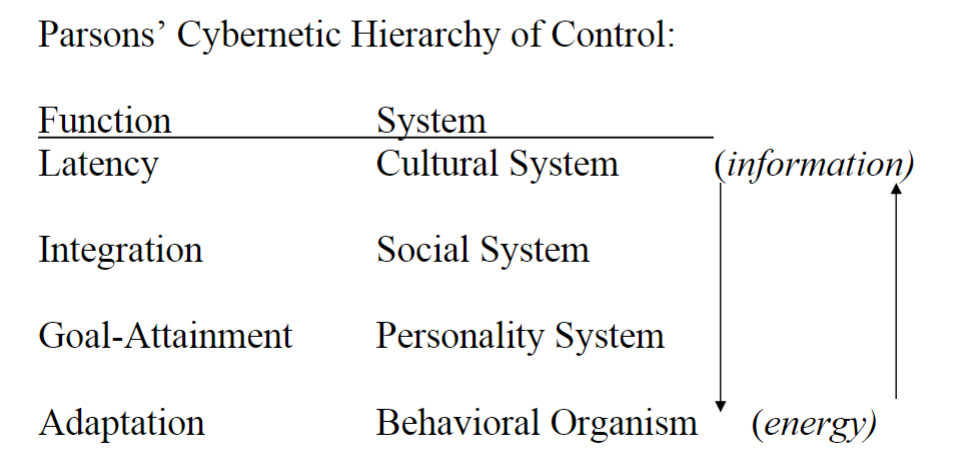
Parsons subsystems (social institutions) to satisfy function requisites
latency = cultural system = fiduciary system
integration = social system = societal community
goal attainment = personality system = polity
adaptation = behavioral organism = economy
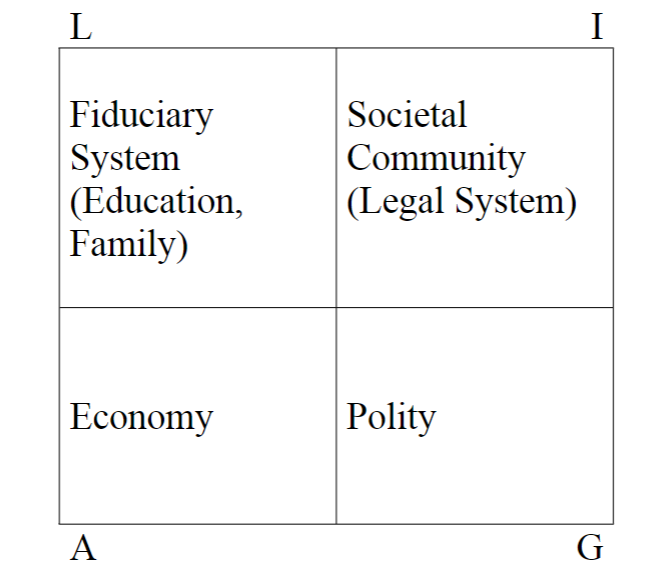
economy
the subsystem of society that performs the function of adapting to the environment and organizing resources (Parsons).
polity
the subsystem of society that performs the function of goal attainment by pursuing societal objectives and mobilizing actors and resources to that end (Parsons).
societal community
the subsystem of society that performs the integration function coordinating the components of society; the legal system (Parsons).
fiduciary system
the subsystem of society that handles pattern maintenance and latency function by transmitting culture to actors and seeing to it that they internalize that culture (Parsons).
e.g. education, family
Parsons’ structural functionalism combined into the unit act
actor = adaptation = behavioral organism
end/goal = goal attainment = personality system
social conditions = integration = social system
culture = latency = cultural system
social conditions and culture impact the actor, means, and end/goal
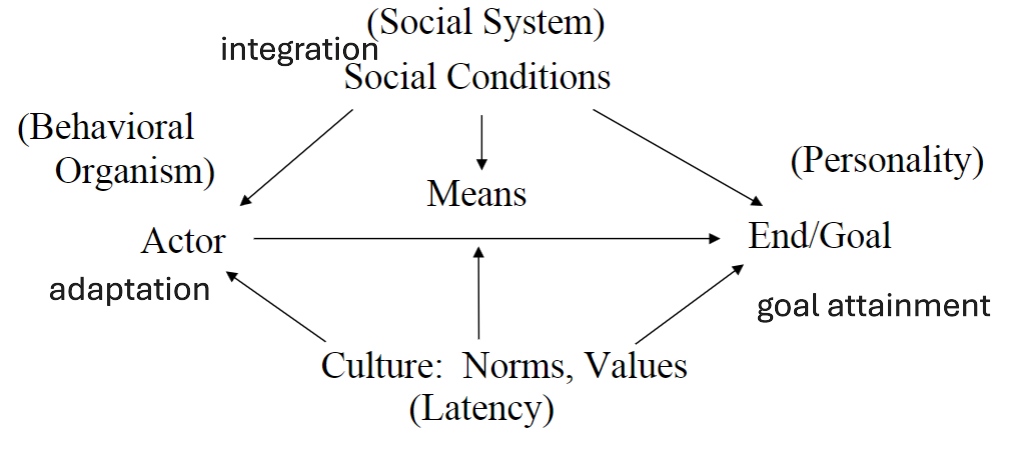
Robert Merton
Parsons’ student
criticized grand theories for being too abstract
advocated for middle-range theories, which focus on specific social phenomena (e.g., deviance, bureaucracy, social mobility)
bridge gap between empirical research and broad sociological theory
manifest and latent functions
explains why institutions persist despite dysfunctions
strain theory (anomie and deviance)
manifest functions
intended and recognized consequences of social action (Merton).
e.g., schools provide education
latent functions
unintended and often hidden consequences of social actions (Merton).
e.g., schools reinforce social class divisions
strain theory
a sociological theory that explains the relationship between social structure and deviance (Merton).
types:
conformity
innovation
ritualism
retreatism
rebellion
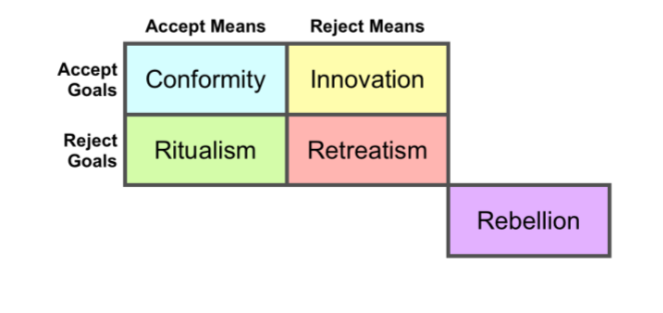
conformity
actor accepts means and goals of society (Merton).
innovation
actor rejects means but accepts goals of society (Merton).
ritualism
actor accepts means but rejects goals of society (Merton).
retreatism
actor rejects means and rejects goals of society (Merton).
rebellion
actor challenges societal goals and means (Merton).
dysfunctions
observable consequences that have adverse effects on the ability of a particular system to adapt or adjust (Merton).
nonfunctions
consequences that are irrelevant to the system under consideration (Merton).
e.g., social forms from earlier historical times that have no effects on contemporary society.
unanticipated consequences
unexpected positive, negative, and irrelevant consequences (Merton).
e.g., latent functions
anomie (Merton)
a situation in which there is a serious disconnection between social structure and culture (between the structurally created abilities of people to act in accord with cultural norms and goals & the norms and goals themselves).
basic postulates of functional analysis
the functional unity of society
universal functionalism
indispensability
all refuted by Merton